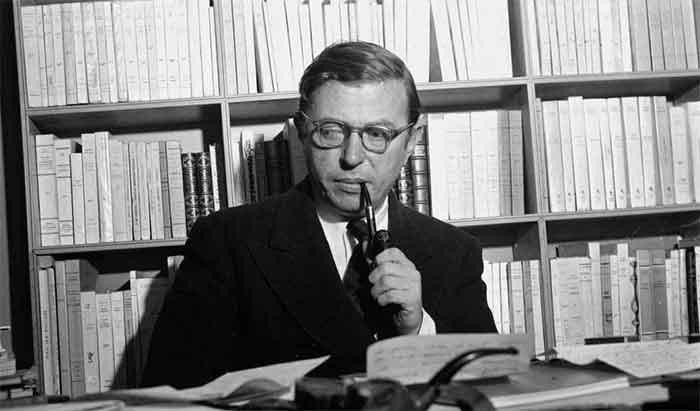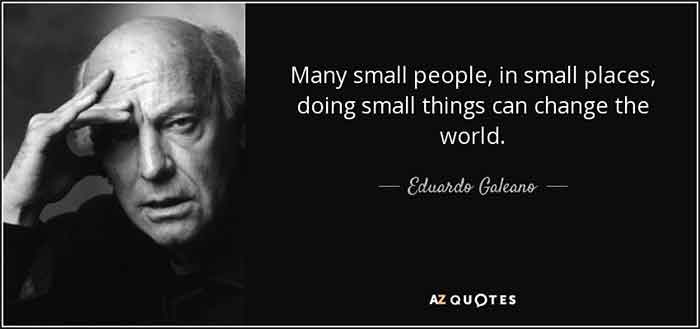
Jean-Paul Sartre (1905–80) is one of the greatest French thinkers. A polemical and witty essayist, a metaphysician of subjectivity, a political activist, a revolutionary political theorist, a humanistic novelist, a didactic playwright, his genius lies in his powers of philosophical synthesis and the genre breaching breadth of his imagination.
The last philosopher to be discussed at some length, Jean-Paul Sartre, is a thinker who has concentrated on man as a free agent and whose personal commitment in the social and political area is well known. Jean-Paul Sartre’s two most important philosophic works are ‘Being and Nothingness’ and the ‘Critique of Dialectical Reason’. In the latter, Sartre presents the historical dimension lacking in his earlier existential classic. Both works are difficult, not because Sartre wished to be esoteric but because of his conviction that philosophic methodology should arise from the subject matter itself, which, for Sartre, was always the human reality in its concrete situation. Despite the Critique’s formidable complexity, Sartre had in mind a wide readership: students of philosophy, political science, and sociology-indeed, everyone who was willing to work toward that time in which we would consciously direct the course of our history. Jean-Paul Sartre, however, agrees that there is no perennial Philosophy. One distinctive function of philosophy is to provide the people of a historical period with an understanding of themselves, an understanding that is different, for example, from that enabled by literature. Good philosophy, like good literature, puts everything into question. Literature, however, has style, a cultivated ambiguity that speaks to us on several levels. But the bond of reader to writer, in a world where so many are illiterate and undernourished, is an unspoken elitism that literature cannot directly address without becoming didactic. Philosophy also works within ambiguity, but it struggles to say something clear about the human condition. The Critique aims at unveiling the mystifications within human relations, so that, at least from one perspective, we can see ourselves in a univocal light. In such a philosophy, the issue of its own elitism is substantive, and the status of the investigator becomes an integral part of the investigation. Sartre was not just a philosopher. Far from it; there were few literary genres to which he did not turn his hand. He published his first novel, Nausea, in 1938, to critical acclaim. It was to be followed by three others in the 1940s. In the interim, Sartre had turned to the stage. His first play was performed in the prisoner-of war camp in which he was detained following the German occupation of France; subsequently he would become a prolific playwright. He also wrote short stories, biographies of French literary greats (including a massive and unfinished study of Flaubert, which runs to well over two thousand pages), an autobiography, political commentary, aesthetic criticism. Sartre was above all a writer. In 1964 he was offered, and declined, the Nobel Prize for literature: Sartre’s fame as an author was international.
A philosophic methodology is like the Midas touch: everything it handles becomes a philosophic issue, including the methodology itself. Sartre here views a dialectical method as more likely than an analytic one to provide a critical perspective, because the dialectic continually accepts that “the question, the questioner, and the questioned” cannot be separated. The dialectic, however, is not an intellectual tool that one first prepares and sharpens before proceeding to reason dialectically. One reasons dialectically only if content is being developed in a way that also reveals the dialectician at work. The size and complexity of the Critique arise, therefore, from the enterprise itself. Jean-Paul Sartre said on philosophical understanding “You are making us into monstrosities; your humanism claims we are at one with the rest of humanity but your racist methods set us apart.” The point is however that in the thought of Sartre the emphasis on human freedom which was characteristic of the line of thought stemming from Maine de Biran has met the line of thought which lays stress on man in society and regards the French revolution as simply one stage in an unfinished process of social transformation.
An extraordinary scene very rarely in the history of Western thought has a mere philosopher commanded such respect from his contemporaries. Moreover, Sartre’s fame extended well beyond France. The news of his death made the front pages of not only the major French newspapers like Le Monde (which devoted a full eight pages to his passing) and Le Figaro, but also the New York Times and the Washington Post. The then president of Italy sent a message of condolence to Simone de Beauvoir, Sartre’s closest companion, and Valéry Giscard d’Estaing, the then president of France went to the hospital where Sartre had died and sat in a solitary vigil for a full hour.
Sartre and Objectivism
At first glance it might well seem that Sartre himself ought to be committed to objectivism. After all, the distinction that underlies objectivism, between the objective world as it really is and the merely human world of values, seems to parallel closely the distinction that Sartre insists upon, between being and nothingness, between what he will call the ‘in-itself’ the world as it would be without human beings and the ‘for-itself’, the being of consciousness.
The great prestige of the scientific viewpoint has obscured the truth of these theses from us; we misunderstand our own being in the world and take ourselves for disinterested spectators, because we believe that our engagements are at bottom no more than subjective projections. In fact, this is to get things exactly backwards. Objectivity is not the fundamental manner in which being is revealed to us; instead, it is a derived manner of being, which we reveal when we step back from our involvement in the world and its instrumental complexes. The point of view of pure knowledge is contradictory; there is only the point of view of engaged knowledge. This amounts to saying that knowledge and action are only two abstract aspects of an original concrete relation. Sartre’s existentialism was never a pure existentialism. One of his outstanding philosophical syntheses is the fusing of existentialism with phenomenology. The Moravian, German-speaking philosopher Edmund Husserl (1859–1938) and his Austrian teacher, the psychologist and philosopher Franz Brentano (1838–1917), are the founders of phenomenology. Phenomenology is the attempt to explain the possibility of all knowledge, including philosophy, by describing the content and structure of consciousness. It was Husserl’s hope that this partly Cartesian and partly Kantian project would place all knowledge on indubitable and incorrigible foundations. Sartre was not alone or wholly original in marrying phenomenology and existentialism into a single philosophy. Sartre’s Marxism was never a pure Marxism. Not only did he never join the PCF (Parti Communiste Français), the second massive synthesis of his philosophical career was the fusion of Marxism with existentialism. Sartre’s Marxism is a ‘humanistic’ Marxism. His faith in Marxism as the most advanced philosophy of human liberation is tempered by his awareness of the crushing of the aspirations of the human individual by actual Marxism in, for example, the Soviet collectivisation of the farms and purges of the 1930s and 1940s, the suppression of the Hungarian uprising of 1956, the decades of atrocities in the Soviet Gulag, the ending of the Prague Spring in 1968. Like the Austrian philosopher Karl Popper, Sartre does not think the oppression of the individual by communism is only a problem of political practice.3 He thinks Marxist political theory is flawed. Unlike Popper however, he seeks to humanise Marxist theory rather than reject it utterly. Also unlike Popper, he thinks the neglected resources for a theory of the freedom of the individual can be found within the early writings of Marx himself. The young Marx is to be construed as a kind of proto-existentialist.
Despite the fact that Sartre’s overt anarchism emerges only at the end of his life – it is mainly professed in a series of interviews with his then secretary Benny Lévy for the magazine Le Nouvel Observateur – Sartre also claimed in the 1970s that he had always been an anarchist. Anarchism is the theory that the abolition of the state is both possible and desirable. It is true that Sartre was a figure who increasingly challenged authority, especially the authority of the state; from the mocking of bourgeois values in the 1938 novel Nausea (La Nausée), through the support for the Algerian and Cuban rebels in the 1950s and early 1960s, and a host of other left-wing or anti-colonial causes, to his hawking of Maoist newsheets on the streets of Paris in the early 1970s. Sartre cannot make his choice for him. To choose an adviser is to make a choice. It is also to choose the kind of advice one would like to hear. in this example Sartre turns the tables on the determinist, It is the lived confrontation with freedom that is concrete and real. Determinism is a scientific abstraction. Even if determinism were true it would not be of the least help to the young man in resolving his dilemma. Nothing can lift from us the burden of our freedom.
Sartre says we are condemned to be free. We did not choose to be free; indeed, we did not choose to exist. In the Heideggerian idiom, Sartre says we are thrown into the world. We have no pre-determined essence. First of all we exist, then we face the lifelong burden of creating ourselves, generating our essence by free choices. We are nothing other than what we do and the only constraint on our freedom is this: we are are not free not to be free. The recognition of our own freedom causes such anxiety that we pretend to ourselves that we are not free. The multitude of behavioural strategies which make up this pretence Sartre calls bad faith. He thinks most of us are in bad faith most of the time. It is usually only in extremis, like Mathieu in the clock tower, that we are confronted with the reality of our own freedom. Since Sartre’s death in 1980 a number of significant works have been published: War Diaries (Les Carnets de la Drôle de Guerre, 1983) composed on the Maginot Line during the ‘phoney war’ period September 1939–May 1940, Notebooks for an Ethics (Cahiers pour une morale, 1983) which provides some of the moral philosophy promised at the end of Being and Nothingness, two volumes of correspondence with Simone de Beauvoir and others: Lettres au Castor et à Quelques Autres, I 1926–39, II 1940–63 (1983), the screenplay for a film about Freud, Le Scenario Freud (1984), the second volume of Critique of Dialectical Reason (Critique de la Raison Dialectique, Tome II: L’intelligibilité de l’Histoire, 1986) and the metaphysically trenchant Truth and Existence (Vérité et Existence, 1989). The thesis that self-definition ceases at the moment of death clearly needs to be treated with some caution.
Biography
I Pravat Ranjan Sethi finished my studies from Centre for Historical Studies, JNU, New Delhi, at present teaching at Delhi University. The keen area of interest is Modern History in particular Nationalism, Political History& Critical Theory and Social Theory.
SIGN UP FOR COUNTERCURRENTS DAILY NEWSLETTER
















































